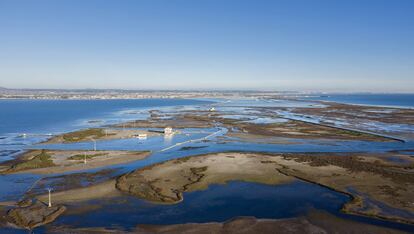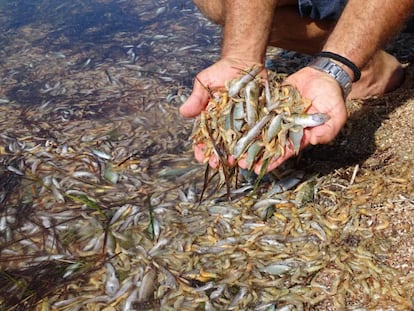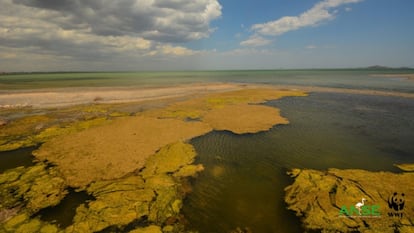New law protecting Spain’s Mar Menor leaves nobody satisfied
Environmentalists say it allows a similar use of fertilizers, while farmers claim it will seriously harm the sector


The parliament in Spain’s Murcia region on Wednesday approved a new law to protect a unique saltwater lagoon called Mar Menor, which has attracted international attention after thousands of fish washed up dead on its shores last year, evidencing decades of pollution.
But the new legislation has pleased neither environmentalists, who consider it entirely insufficient, nor farmers, who maintain the law will drive agriculture from the area.
For decades, the Mar Menor has been absorbing the nitrates and phosphates from agricultural practices, which scientists blame for at least 80% of the pollution that led to the total collapse of the lagoon in 2016. Following a slight recovery, the torrential rains of last autumn once again pushed this unique ecosystem over the edge, flooding the lagoon with contaminated water, starving it of oxygen and causing a mass of dead marine life.

The beaches in the area are now little more than mud banks and, according to the latest report from the Spanish Institute of Oceanography, the problem has become so chronic that the lagoon will take decades to recover.
The new legislation replaces a decree passed in December 2019, which the Socialist Party (PSOE) and Ciudadanos (Citizens) forced through as a bill with a view to modifying it through amendments. Now both the PSOE and Ciudadanos, together with the right-leaning Popular Party (PP), have agreed on more than 80% of the approximately 100 amendments. These include the obligation to report annually on the degree of execution and compliance with the law, and the reduction from five to three years for the approval of a Territorial Land Management Plan for the area.
Sustainable precision agriculture
In order to reduce the impact of agricultural residue, amendments have also been introduced to encourage the progressive transformation of agricultural activity, moving it towards rain-fed crops and “sustainable, precision agriculture.” Farmers will also be obliged to do away with illegal irrigation, and preferably convert this land into forest to absorb nitrates and other residues.
Highly prized was the modification of Article 29, which originally established a 500-meter fertilizer-free strip around the lagoon. According to the new legislation, this strip now has to be 1,500 meters. However, while the use of fertilizers, non-composted manure or green manure will be prohibited in the additional 1,000 meters, as will the establishment of new greenhouses or the expansion of existing ones, rain-fed crops, organic farming and “sustainable precision agriculture” will be allowed in consolidated areas, providing the use of fertilizer does not exceed 170 kilograms of nitrates per hectare per year.

According to Pedro Luengo, from Ecologists in Action, in practice this allows the existing agricultural model to be maintained without change. “They have come up with an illogical term such as ‘sustainable precision agriculture’ to portray the current intensive irrigation practices of industrialized crops as sustainable,” he says, adding that calling this amendment the “extension of protection” is misleading because the crops are not actually being banned.
A similar observation has been made by Ramón Pagán, a chemist and coordinating member of the Pact for the Mar Menor citizen movement, who points out that the fertilizer-free strip was meant to act as a “green filter” capable of absorbing the nitrates from the entire Campo de Cartagena basin. “But if there is still fertilizer in that strip, it is completely ineffectual,” he says, adding that last week, after declaring that the underground aquifer that crosses the region is at risk from contamination from nitrates, the Segura River Authority (CHS) proposed “more restrictive” measures than those proposed by the new regional law.
The angry response to this proposal from Murcia’s regional chief of water, agriculture and environmental affairs, Antonio Luengo, was described as “astounding” by the Association of Naturalists of the Southeast (ANSE). According to ANSE president Pedro García, the measures proposed by the CHS, along with the new law, could in fact be the first step towards improving protection for the lagoon.
No enforcement
But García underscores that for years, the problem has not been so much a lack of legal protection, but rather a general non-compliance with the law. Consequently, he insists that the effectiveness of the law can only be assessed according to its implementation in areas such as illegal irrigation, for example, which is used to water around 10,000 hectares – 20% of the total crops in the area.
Meanwhile, the main agricultural producers’ organizations, such as COAG, UPA and ASAJA, have issued a joint statement in which they recognize the existence of these unlicensed irrigation systems and “condemn them without reservation”, but warn that linking all solutions for the Mar Menor to restrictions on agriculture is irresponsible and will not improve the environment unless other issues such as urban waste and motorized water sports are also taken into consideration, as well as flood prevention measures.
Similarly, Natalia Corbalán, director of the Ingenio Foundation, which represents some 10,000 farmers and 50 agro-industrial companies in the Campo de Cartagena, states that 70% of the new legislation attacks the agricultural sector. While she recognizes that agriculture “has an impact on the lagoon,” she warns that the measures will make the sector unviable in the area.
Corbalán believes that the legislation has been pushed through rashly without taking into account scientific and technical criteria to support the proposed measures. On this point the farming sector agrees with the environmental and social platforms: they have been listened to by lawmakers, but none of their proposals have been incorporated into the new law.
Environmental personhood
Authorities in towns located along the Mar Menor are taking the initiative in an effort to protect a saltwater lagoon that plays a crucial role in the local economy.
In Los Alcázares, where the beach is in a particularly bad state, the local council on Thursday approved a legislative initiative to try to confer legal personality to the Mar Menor, a move that would give the lagoon certain rights.
The idea is not new. There are other natural spaces in the world that have recently acquired environmental personhood, including the Atrato river in Colombia and the Whanganui river in New Zealand.
In Spain, starting such an initiative required backing from a municipality with a registered population of over 10,000, and Los Alcázares mayor Mario Cervera, of the Socialist Party (PSOE), said he was willing to get behind the move despite the low probability of its making any headway in the regional parliament of Murcia, which will have to decide whether it agrees to bring it to the floor for debate or even send it to Spanish Congress.
It will not be an easy road. The legal department of Los Alcázares town council has issued an unfavorable report noting that granting environmental personhood falls outside the powers of the regional parliament. The local opposition says the move is nothing more than “posturing,” but the mayor holds that this will force regional lawmakers to “take a stand.”
“This is not just pie in the sky,” said Cervera. “It’s about starting a process that should have begun many years ago.”
English version by Heather Galloway.
Tu suscripción se está usando en otro dispositivo
¿Quieres añadir otro usuario a tu suscripción?
Si continúas leyendo en este dispositivo, no se podrá leer en el otro.
FlechaTu suscripción se está usando en otro dispositivo y solo puedes acceder a EL PAÍS desde un dispositivo a la vez.
Si quieres compartir tu cuenta, cambia tu suscripción a la modalidad Premium, así podrás añadir otro usuario. Cada uno accederá con su propia cuenta de email, lo que os permitirá personalizar vuestra experiencia en EL PAÍS.
¿Tienes una suscripción de empresa? Accede aquí para contratar más cuentas.
En el caso de no saber quién está usando tu cuenta, te recomendamos cambiar tu contraseña aquí.
Si decides continuar compartiendo tu cuenta, este mensaje se mostrará en tu dispositivo y en el de la otra persona que está usando tu cuenta de forma indefinida, afectando a tu experiencia de lectura. Puedes consultar aquí los términos y condiciones de la suscripción digital.








































